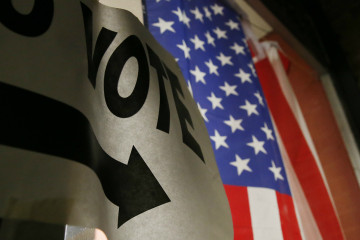

America’s general election was less than a year ago, but with local, state and midterm elections fast approaching, and with early voting already well underway, Muslim groups are wasting no time in getting their community out to vote.
“We’re often the subject of political discourse, and we’re affected by policies, so it’s important to mobilise voters,” says Tala Dahbour, policy director at the Council on American-Islamic Relations-Ohio, which like other groups across the country has organised voting drives in recent weeks. “It affects you whether you realise it or not.”
As a growing voting bloc with substantial populations in swing states with upcoming elections in November, such as a possible special election in Ohio, a gubernatorial election in Virginia, as well as local and state elections across the country, Muslim votes are increasingly important.
“We need to ensure that we build on and not reverse the progress we’ve had in Virginia,” says Sam Rasoul, one of the two Muslim members of the General Assembly and one of nine elected officials in Virginia, where the Muslim population has grown considerably in the past decade, part of the state’s demographic change that has come along with its political shift from red to a solidly blue.
"We’re often the subject of political discourse, and we’re affected by policies, so it’s important to mobilise voters"
“We really are the bellwether for the rest of the country,” he tells The New Arab. “We want to make sure we’re setting the tone for the rest of the country as we head into the midterms in 2022.”
Muslims in the US have long been in the unfortunate position of being adversely affected by government policies, while largely staying low-profile as part of a relatively small minority.
Over the past two decades, however, as their numbers – now estimated at around 3.5 million, according to Pew – and visibility have grown, they have become important constituents that politicians need to court for votes.
Moreover, an increasing number are running for office – and winning, showing that a community can grow its political clout through consistent organising.
The September 11, 2001 attacks on New York and Washington sparked a wave of activism among Muslim Americans, following widespread discrimination. But this did not immediately translate into substantial voter engagement, despite post-9/11 policies that directly impacted the community.
It wasn’t until the 2020 election, after four years of Donald Trump’s explicit anti-Muslim policies and rhetoric, that the Muslim vote was truly mobilised.
Among the most impactful 2020 Muslim voter outreach drives was through Emgage, whose Million Muslim Votes campaign helped flip swing states like Michigan blue. Before that, prior to the 2018 congressional run of Rashida Tlaib, Muslim voter registration in some parts of the state was in the single digits, a sign of long-time voter disengagement.
Amid all of these efforts, Muslim voter turnout remains low compared with that of other communities, though it is catching up. Continuous engagement is key to developing a strong voting bloc.
In addition to getting out the vote, policies that ease the voting process play an important role. Ahmed Mohamed, legal director for CAIR-New York, which recently held primaries for city and municipal elections, says experience has shown Muslims are often do not decide to vote until election day, making same-day voter registration an important option.
He stresses that for Muslim political engagement continue its momentum, it needs to become a part of people’s everyday lives. Mosques, like churches, are being used as centres for voter outreach, and increasingly as destinations for politicians courting votes, which can no longer be taken for granted.
"I believe the presidency of Trump, which was a clear and present danger, was a wake-up call that we must be engaged in the civic affairs of our nation"
“Being engaged is a 365-day process. It doesn’t stop because you voted or you protested. You have to be active. That’s how you maximise your voice,” Mohamed says.
Najee Ali, founder of the Muslim Democratic Club of Southern California, sees engagement as essential for preserving and advocating for civil rights.
“I believe the presidency of Trump, which was a clear and present danger, was a wake-up call that we must be engaged in the civic affairs of our nation,” he tells The New Arab. “We realise that politics is power.”
Brooke Anderson is The New Arab's correspondent in Washington DC, covering US and international politics, business, and culture.
Follow her on Twitter: @Brookethenews




 Follow the Middle East's top stories in English at The New Arab on Google News
Follow the Middle East's top stories in English at The New Arab on Google News


